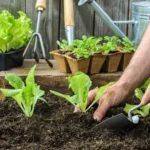Fresh herbs add vibrant flavor and aroma to your meals, but they don’t last long once picked. If you want to enjoy your garden’s bounty all year round, learning how to save fresh herbs is essential. With the right techniques, you can preserve their taste and aroma while reducing waste.
Whether you grow basil, rosemary, thyme, or parsley, simple methods like drying, freezing, or storing herbs properly can keep them fresh and ready to use. This guide will help you extend the life of your herbs so you can savor garden-fresh flavors anytime.
Choosing the Right Herbs to Save
Selecting herbs that maintain flavor and freshness after harvesting makes preserving your garden bounty successful. Focus on herbs that respond well to drying, freezing, or storing to maximize quality and longevity.
Best Herbs for Saving from the Garden
Choose herbs like basil, rosemary, thyme, parsley, oregano, and mint for preservation. These herbs retain aroma and taste after drying and freezing. Basil and parsley freeze well when chopped and stored in ice cube trays. Rosemary, thyme, and oregano hold up best when air-dried in bunches. Mint works well either dried or frozen, providing versatility for later use.
Signs of Healthy Herbs for Harvesting
Pick herbs with vibrant color, sturdy stems, and no signs of wilting or discoloration. Look for leaves free from spots, holes, or pests. Harvest in the morning after dew evaporates to ensure maximum essential oil content and flavor concentration. Always select young, tender growth for the best taste and ease of drying or freezing.
Methods to Preserve Fresh Herbs
Preserving fresh herbs from your garden ensures you can enjoy their flavors beyond the growing season. Use different preservation methods to match herb types and intended uses.
Drying Techniques for Long-Term Storage
Air drying works best with woody herbs like rosemary, thyme, and oregano. Tie small bundles and hang them upside down in a warm, dry, well-ventilated area away from direct sunlight. Check after 1-2 weeks; herbs should crumble easily when fully dry. Use a dehydrator set at 95°F if faster drying suits your schedule. Avoid drying delicate herbs like basil or parsley this way, as they lose flavor quickly and darken.
Freezing Herbs for Maximum Freshness
Freezing retains flavor and color effectively for tender herbs like basil, parsley, cilantro, and mint. Chop leaves and place them in ice cube trays with water or olive oil, then freeze. Alternatively, spread whole leaves on a baking sheet to freeze individually before transferring to airtight bags. Label and use within 6 months for optimal taste and aroma.
Storing Herbs in Oil or Butter
Combining herbs with oil or butter locks in flavors and creates ready-to-use seasoning bases. Chop fresh herbs and mix with softened butter or pour them into clean jars to cover with olive oil. Freeze in small containers or ice cube trays. Use herb-infused oils in dressings and sautés; herb butters melt over meats and vegetables, enhancing dishes with fresh garden flavors.
Harvesting Tips for Saving Herbs
Harvesting herbs at the right time and using proper techniques ensures their flavors stay vibrant for preservation. Follow these tips to maximize the quality of your saved herbs.
When and How to Harvest Herbs Properly
Harvest herbs early in the morning when their essential oils are at peak concentration, except after heavy rain, which dilutes flavor. Select healthy, vibrant leaves free from pests or disease. Use clean, sharp scissors or pruning shears to cut stems about 4 to 6 inches from the top, avoiding more than one-third of the plant to prevent stress. Harvest before flowering as herbs tend to lose flavor once they bloom, except for oregano and thyme, which develop stronger flavors during flowering.
Preparing Herbs Before Preservation
Rinse herbs gently under cool water to remove dirt and insects, then pat dry completely using paper towels or a clean kitchen towel to avoid mold during storage or drying. Strip lower leaves from woody stems like rosemary and thyme for easier drying. For tender herbs such as basil and parsley, remove damaged or yellowed leaves before chopping or freezing. Group herbs with similar moisture content together to optimize drying time and quality.
Common Mistakes to Avoid When Saving Herbs
Avoiding common mistakes ensures your saved herbs retain flavor, aroma, and freshness. Focus on proper techniques to maximize the quality of preserved herbs.
Overcrowding and Poor Air Circulation
Overcrowding herbs during drying traps moisture and causes mold or uneven drying. Hang herbs in small, loose bundles or spread leaves on a single layer with enough space between them. Use a well-ventilated, dry area to promote airflow and prevent dampness. Avoid drying in humid environments or sealed containers until herbs are fully dry.
Harvesting at the Wrong Time
Harvesting herbs too late or too early affects flavor and potency. Pick herbs early in the morning, after dew dries but before midday heat, to capture peak essential oils. Avoid harvesting once herbs start flowering unless species like oregano or thyme benefit from bloom-stage harvesting. Also, never harvest more than one-third of the plant at once to allow regrowth and maintain plant health.
Conclusion
Saving fresh herbs from your garden lets you enjoy their vibrant flavors long after the growing season ends. By using the right preservation methods and following simple harvesting tips, you can reduce waste and keep your kitchen stocked with garden-fresh seasoning. With a little care and attention, your herbs will stay flavorful and ready to enhance any dish whenever you need them.

Hi, I’m Md Rofiqul, a gardening enthusiast who loves spending time in the garden and backyard. I enjoy caring for plants, growing flowers and vegetables, and creating a green space that feels peaceful and refreshing. Gardening is more than just a hobby, it’s a passion that connects me to nature and brings joy to my daily life. Living with plants inspires me to embrace simplicity, patience, and sustainability while making every day more colorful and rewarding.

